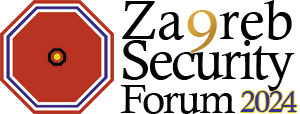
October 11th-12st, 2024
9th ZAGREB SECURITY FORUM 2024
NATO and EU Cooperation – a Key for Resilient Future
Speakers and Panel Chairs of the 9th Zagreb Security Forum
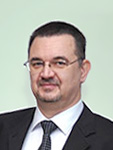
Assoc. Prof. Gordan Akrap, Hybrid Warfare Research Institute, Croatia, born 1966, graduated at Zagreb Faculty of electronics and computing in 1994. In 2011 he received a PhD at the University of Zagreb, in the field of Information and Communication sciences. The title of his PhD was “Informational strategies and operations in public knowledge shaping”. He had an active role in Croatia’s Homeland war. During his career in diplomatic and security structures of Croatia he completed a number of professional courses, including Diplomatic Academy. He is active in research of national and regional security, intelligence and history of Homeland War. He was part of the international project "Military Aspects of Countering Hybrid War: Experience, Lessons, Best Practices." He published several books, and papers in journals and proceedings. He is editor-in-chief of National Security and the Future journal, and Vice-rector of Dr. Franjo Tuđman Defense and Security University.

Mr. Holger Haibach. During his studies in 1997 he was the electoral district assistant of Brigitte Kölsch, Member of the Landtag. From 1995 to 1999 he was a research assistant at the Institute of classic Philology, Justus-Liebig-University, Glessen. From 2002 to 2011 he was a directly elected member of the German Bundestag; Deputy Chairman of the Committee for Human Rights and Humanitarian Aid; Spokesman of the CDU/CSU parliamentary group for Economic Cooperation and Development from 2009 to 2011. From 2005 to 2011 he was an alternate member of the Foreign Affairs Committee and at the same time member of the Subcommittee on Arms Control and Non-Proliferation. From 2011 to 2013 Konrad-Adenauer-Stiftung e.V.: Head of the Foreign Office for Namibia and Angola. From 2014 to 2015 he was named Head of the Chile Foreign office based in Santiago de Chile of the Konrad-Adenauer-Stiftung e.V. From 2015 to 2018 he was Head of Central Tasks and Services Department of CDU Germany. Since 2019 Konrad-Adenauer-Stiftung e.V.: Head of the Foreign Office for Croatia and Slovenia.

Prof. Dr. Shlomo Shpiro, president of International Intelligence History association, Israel, Head of the Europa Institute at bar Ilan University and Senior Research Fellow at the BESA Centre for Strategic Studies. Since 2008 he is also Chairman of the International Intelligence History Association (IIHA). He specializes in intelligence, terrorism and security studies. His research activities concentrate on the role of intelligence services as political mediators in the international arena, the intelligence activities of terror organisations, intelligence ethics and political influence, and on security crisis management and crisis communication.

Dubravka Šuica, European Commission Vice-President for Democracy and Demography is a Croatian politician from the city of Dubrovnik, where she served two terms as its first female mayor. In 2006 she was awarded the World Mayor Award. Mrs Šuica holds a Degree in English and German from Zagreb Faculty of Humanities and Social Sciences. She and started her career in education: first as a teacher and later as the Director of the Dubrovnik High School. She entered politics in the 1990s as a Member of the Croatian Democratic Union and served three terms as a Member of Croatian Parliament and Vice-Chair of the EU Integration Committee. Between 2004 and 2009 Dubravka Šuica was a Board Member of the Union of the Association of Towns and Municipalities of the Republic of Croatia, and later served as Councilor of the Dubrovnik-Neretva County Assembly. During ten years she was President of the Croatian Delegation to the Congress of Local and Regional Authorities of the Council of Europe. From 2013 to 2019 Dubravka Šuica served as a Member of the European Parliament, responsible for issues related to environment, public health and food safety as well as foreign affairs. She was the head of Croatian EPP delegation in the European parliament. In June 2019, Šuica was elected as first Vice-Chair of EPP Group in the European Parliament.
Since December 2019, Dubravka Šuica is Vice-President of the European Commission in charge of Democracy and Demography.

Major General (ret.) Paul Hurmuz, after attending the Staff College between 1990 and 1992, he was appointed as a Battalion Commander, before joining the Romanian Military Intelligence Directorate in 1993. Between January 2003 and December 2007 he assumed the position of Defence, Military, Air and Naval Attaché in London, UK. In this capacity, he represented the Romanian MOD in different formats during Iraq, Afghanistan and Balkans operations.
Since January 2008, he was the Head of Plan, Policy and International Cooperation in the Military Intelligence Directorate. Between January and July 2013, he attended the National Defence College in Bucharest. Since 12 September 2013 until 1st September 2016, Paul HURMUZ assumed the position as the Deputy Director of the Intelligence Division in the International Military Staff (NATO HQ). In this capacity he was also responsible as the Chair of the Military Intelligence Committee (Working Level), the Senior Military Coordinator for Joint Intelligence, Surveillance and Reconnaissance (JISR) and the Chair of the NATO Geospatial Board (NGB). He was promoted to the rank of Brigadier General on 1st December 2013. In his role as the NATO Senior Military Coordinator for JISR, he ensured senior-level, cross functional coordination across the International Military Staff, Strategic Commands and NATO Agencies for this high visibility project and was instrumental in achieving the Initial Operational Capability for NATO JISR. On 1st December 2016 he was promoted to Major General. He retired in August 2017 after 34 years of military service. During his career and after retirement he has been actively attending the activities organized by the Royal United Services Institute and the Chatham House (London, UK). Since 2017 he has also organized and moderated panels on Security and Defence subjects in Romania. He is active in New Strategy Center in Romania.

Brigadier General (ret.) Bruno Cunat is an air force officer who has served for 30 years. He is a fighter pilot by trade. He has an operational background on Mirage 2000 and has been deployed in the Balkans and in the Baltic states. He has also commanded two different air force squadrons and a joint base (2500 personnels). He has graduated from the „Ecole de Guerre“ (2008) and the UK Higher Command and Staff Course (HCSC 2018). Overall he has spent five years in teh UK, has a pilot in the RAF (19 Sqn) and as the liasion officer, he has also an interagency experience in SGDSN (Prime Minister's administration), and he is now deeply involved in the development of defense cooperation with partners in the euro-atlantic area. He is married and has three children. He enjoys running, crossfit as an amateur, and to watch rugby in a pub with good friends and a beer.

Col Viacheslav Semenenko, PhD, The Center for Military and Strategic Studies of the National Defence University of Ukraine. Born 1976, graduated from some military institutions, last of them was the National Defence University of Ukraine (strategic level) in 2017. PhD in technical sciences (2012). Associate professor (2015). Major directions of research: hybrid war, military policy and military strategy, logistic, armament. Нe is operating within the framework of the International Project / Military Aspects of Countering Hybrid Warfare: Experiences, Lessons, Best Practices. He is currently participating in the Russian-Ukrainian war, the active phase of which began with the Russian invasion on February 24, 2022.

Ieva Gajauskaite holds a PhD in Political Science from Vytautas Magnus university, Lithuania. Her training includes various long-term scientific internships, work at think-tank projects, etc.
Her current research projects examine strategic partnerships, foreign interference, hybrid threats, and democratic resilience with a focus on the East Asia and the Baltic States

Odd Jarl Borch is a Professor of Strategy and Crisis Management at the Nord University Bodo, Norway. Borch received his M.Sc. from The Norwegian School of Economics and Business Administration in Bergen, Norway in 1979, his doctoral degree (PhD) from Umea University in Sweden in 1990. He also has Master Mariner education from Bodin Maritime Academy with experience from the Norwegian offshore oil and gas sector.Dr. Borch is conducting research within the field of organization and strategic management, with a special focus on crisis management. He has served as a scientific advisor of several government committees within industry development, safety and preparedness. Dr Borch has in his education and research emphasized Arctic safety and security and has been responsible for developing av broad research network in this field among Arctic universities. He is now doing research within total preparedness with a special focus on civilian-military collaboration against hybrid threats.

Tormod Heier is Professor of Military Strategy and Operations, Professor-II at Inland University of Applied Science, and Assistant Professor at Swedish Defence University in Stockholm. Heier has 32 years’ experience as officer in Norway’s Armed Forces, including 15 years as a Lieutenant Colonel in the Army. As an officer, he served among other places in the Army's Brigade North, in Norway’s Intelligence Service, at the Norwegian Ministry of Defense, and in Mazar-e-Sharif, North-Afghanistan. Heier have one doctorate and two master’s degree in political science and War Studies respectively from the University of Oslo and King's College, London. He has published numerous books on Norwegian, allied and Russian operations in the High North, in Afghanistan, Libya and Ukraine. He has also published books on social science methods, and strategic competence management. Heier regularly holds lectures for universities and grass-root organizations, including the Chiefs Course at the Norwegian Defense Academy.

Przemysław Gasztold (Ph.D.) is an Assistant Professor at War Studies University in Warsaw, Department of Security Threats, and a research fellow at the Historical Research Office of the Institute of National Remembrance in Warsaw. He received his Ph.D. from Warsaw University, Faculty of Journalism and Political Science, in 2016. He specializes in intelligence studies, communist movements and international terrorism. Author of 4 books and several dozen articles and chapters published in English, French, German, Norwegian, Dutch, and Albanian. Co-editor (with A. Hanni and T. Riegler) of Terrorism in the Cold War: State Involvement and Covert Operations. Volume 1: Eastern Europe and the Soviet Sphere of Influence; Volume 2: The West, the Middle East and Latin America (IB Tauris/Bloomsbury Publishing, London-New York, 2020). Member of the “Need to Know” intelligence conference’s organizing committee. Managing editor at the Security & Defence Quarterly (Poland) and member of the editorial board at Komunizm: system–ludzie–dokumentacja (Poland), and at National Security and the Future (Croatia).
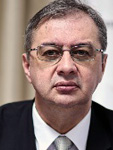
Prof. dr. hab. Iulian Chifu is the president of the Conflict Prevention and Early Warning and professor at the National Defense University and National University for Political and Administrative Studies, Bucharest.
He was Presidential counsellor for strategic affairs, security and foreign policy(2011-2014) and state counselor of the Romanian Prime-Minister for foreign policy, security and strategic affairs(2021-2023)

Daria Vilkova, PhD, is an Assistant Professor at the International Relations and Foreign Policy Department at the Institute of International Relations, Taras Shevchenko National University of Kyiv. The topic of her doctoral research defended in February 2022 is “Fragile states in the international security system.”
The fields of interest are international security, transnational threats, terrorism, political violence, and state fragility. Daria has participated in different programs and conferences in France (University of Nantes), China (Harbin Institute of Technology), Germany (BIGSSS), Young Bled Strategic Forum etc. The latest publications concern the issue of state interventions, international security and war-born challenges for Ukraine. Selected courses include Foreign Policy of Ukraine, Geostrategy, Introduction to International Relations, Theory of International Relations, International Think Tanks, History of International Relations, Strategic Planning, Ukraine in World Politics.

Associate Professor Bojana Lakičević-Đuranović was born in 1984 in Podgorica,where she finished the elementary and high school. She graduated from the Law School of the University of Montenegro in 2007. She completed her Master Studies in 2008 at the Faculty of Law, University of Belgrade, with distinction and defended her Master's Thesis entitled "The Legal Status of Prevlaka in the Light of International Law" in 2008. She started her doctoral studies at the Department of Public International Law at the Law Faculty, University of Belgrade in 2008 where she passed the Oral Doctoral Examination I (Public International Law, Human Rights and International Humanitarian Law) with the highest grade of 10 and the Oral Doctoral Examination II (International Human Rights and International Organizations Law and European Organizations Law) with the highest grade of 10.
In April 2012 she defended the doctoral dissertation with distinction. She has been employed at the Faculty of Law, University of Montenegro since 2008. In 2013 she was conferred the rank of Assistant Professor and became Associate Professor in December 2018 at the University of Montenegro, Faculty of Law for the following academic subjects: International Humanitarian Law, Euro-Atlantic Integration, Fundamentals of EU Law and Diplomacy and Security Services .While being a doctoral student in Belgrade she won the ZAMTES award as the best Montenegrin student abroad. She attended professional training in London.
She has participated in numerous scientific projects and has as well attended numerous professional and scientific conferences in Montenegro and abroad. She is the author of a large number of scientific articles and publications.

Dr. Vira Ratsiborynska is an adjunct Professor on NATO and transatlantic approaches to security and Global politics at the Vrije Universiteit Brussel (VUB). Her areas of research interests include the relations between the EU-NATO and the Eastern partners, Russia and Central Asia, e.g. in energy, trade, geopolitics, border security, conflict management and peacekeeping. Vira Ratsiborynska holds a Ph.D. from the University of Strasbourg, France.
She wrote her dissertation on the European Neighbourhood Policy (with regard to the East) and publishes extensively in English and French on the topics of the European Union and the Eastern flank’s security, the relations with the Eastern Partnership countries, NATO and Russia. She obtained a Master’s degree in EU Studies from the College of Europe (Belgium) and a Master in Political and Social Studies from Sciences Po (France). Her professional experience includes working in support of such organizations as the European institutions and NATO entities.
She also has corporate experience in an American public affairs consultancy in Brussels as well as experience in communication and diplomatic fields. Dr. Ratsiborynska speaks English, French, Russian, Ukrainian, Polish, Dutch, and German.

Eleni Kapsokoli is a post-doctoral candidate at the Department of International and European Studies of the University of Piraeus, Greece, specializing in digital electoral interference. In 2022, she completed her PhD on Islamic cyberterrorism at the same university. She holds a bachelor’s degree from the National and Kapodistrian University of Athens in Political Science and Public Administration, and a master’s degree in International Relations and Strategic Studies from the Panteion University of Social and Political Sciences, Greece.
Her main research interests include international relations, international security, strategy, terrorism, cyberspace, cybersecurity, new technologies, human rights, disinformation, digital authoritarianism, artificial intelligence, American and European politics, and digital democracy. She has published and participated in conferences and research projects related to these fields. Dr. Kapsokoli is also a PhD alumna of the European Doctoral School on Common Security and Defence Policy. She is a research fellow at the Laboratory of Intelligence and Cyber-security at the Department of International and European Studies of the University of Piraeus, as well as at the Foreign Affairs Institute, the Institute for National and International Security of Serbia and the Institute of Studies for Politics and Democracy of Cyprus.
In terms of teaching experience, she has served as an appointed lecturer at Panteion University, Department of International, European and Regional Studies, teaching political science, international relations and strategy. She is also a lecturer at the School of National Security of theHellenic Police Academy for courses on cyberterrorism and cybersecurity. Additionally, she is a lecturer at the Department of History, International Relations & Political Science at Webster University’s Athens Campus, covering American politics, human rights and argumentation and debate. She is an accredited lecturer in the MSc Cybersecurity program, provided jointly by the Mediterranean College in Athens and the University of Derby in the UK, teaching human and legal aspects of cybersecurity.

Linda Jarl is an experienced analyst who works at the Swedish Defence Research Agency (FOI). Her research experience at FOI includes operations analysis, international security, military adaptation, and hybrid warfare. Previously, Linda participated in the activity “NATO STO SAS-161 Research Task Group (RTG) – Military Aspects of Countering Hybrid Warfare: Experiences, Lessons, Best Practices.” In 2023, the research group released several reports on the theme Russian hybrid warfare. Besides her work at FOI, Linda is a PhD student at the Swedish Defence University at the Department of Leadership and Command & Control. Her dissertation project focuses on the Swedish NATO membership, and specifically explores what the integration between Sweden and NATO means for the development of military management within the Swedish Armed Forces.

Ivana Kovačević Bekić was born in Sisak on December 9, 1993. She completed primary and secondary school (4th gymnasium) in Zagreb. After high school, she enrolled in undergraduate studies in journalism and public relations at VERN' University, and in 2015 she enrolled in undergraduate and then graduate studies in military engineering at the University of Zagreb, Faculty of Electrical Engineering and Computing. In 2020, she started his first officer's duty - platoon commander of the S-10 CRO, Ground-based Air Defence in Zemunik, and in the same year she enrolled in a graduate study in journalism and public relations at the University of Zadar. From 2021 until now, she continues her career in the Cyberspace Command, in the Operations Department as a training officer. In 2023, she enrolled in the doctoral study of media and communications at the University of the North. She is married and is mother of one daughter.

Prof. Dr. Giray Sadik is Chair in the Department of International Relations, Faculty of Political Science and Director of European Studies Research Center, both at Ankara Yildirim Beyazit University, Türkiye. Previously, he was Eisenhower Fellow at NATO Defense College (Italy), and Swedish Institute Postdoctoral Fellow in the Department of Global Political Studies at Malmö University (Sweden). Prof. Sadik received his Ph.D. in Political Science from the University of Georgia (USA) specializing in International Relations and Comparative Politics. His current research focuses on international security, Transatlantic relations, hybrid threats, counterterrorism, European security and foreign policy, resilience, border/maritime security. Prof. Sadik is an Expert Pool Member of the European Center of Excellence for Countering Hybrid Threats (Finland). Prof. Sadik was guest lecturer and invited speaker on global security challenges at various international institutions including NATO School Oberammergau (Germany), London School of Economics and Political Science (UK), NATO Maritime Security Center of Excellence (Türkiye), Baltic Defense College (Estonia), Carleton University (Canada), European Policy Center (Belgium), NATO Center of Excellence Defense Against Terrorism (Türkiye), Rondeli Security Conference (Georgia), and he is currently Ludovika Fellow at University of Public Service (Hungary).
.jpg)
Dr. Natalija Parlov (Una) is a highly focused and results-driven security and resilience expert with over 15 years of experience in C-level executive roles, specializing in enhancing organizational resilience through rigorous risk management and adherence to ISO/IEC standards and EU regulatory frameworks. She is a member of the Supervisory Board at OTP Bank, Croatia, and also contributes her expertise as an individual expert in the European Data Protection Board’s (EDPB) Support Pool in the field of “New technologies and information security”. Additionally, Dr. Parlov is a member of the Hybrid Warfare Research Institute, where she collaborates on strategic initiatives related to security and resilience in complex environments. A Lead Tutor for ISO/IEC 27001 and ISO 22301 – cybersecurity, information security, privacy protection and resilience management systems. She is also director and owner of two active companies that focus on compliance, conformity assessments and digital behavioral market analytics, respectively. Her extensive qualifications include accredited executive and expert’s certifications from prestigious institutions such as Oxford, Harvard and MIT, and she holds numerous active international certifications related to cybersecurity, privacy, risk management and ESG-related management systems.

Dr. Goran Leci is a renowned expert in digital transformation and IT/OT convergence, with over 20 years of executive leadership experience, particularly in critical infrastructure sectors such as power and energy. As President of the Board at Hitachi Energy Croatia, he plays a pivotal role in overseeing regional operations in the Balkan area and driving strategic growth in energy systems and digital infrastructure. His leadership in the power and energy industry, a key component of critical infrastructure, is marked by his efforts to enhance security, reliability, and efficiency in energy distribution and transmission networks. He is an active member of the CIGRE Cybersecurity Group. His expertise in industrial and critical infrastructure cybersecurity is demonstrated by his extensive knowledge and practical application of IEC 62443 and IEC 62351, key standards for securing industrial automation and control systems. He also served as the former President of the Board at Končar Digital, the first company in the world to be certified for IEC 62351 in substation automation systems - standard for security of power system control centres and communication networks. Throughout his career, Dr. Leci has successfully led projects across a wide range of industries, with a special focus on improving the efficiency, resilience and security of critical infrastructure, particularly in the power and energy sectors.

Mr. sc. Mladen Pemper is a security expert with 26 years of experience in the state and private sector. He graduated from the Faculty of Criminal Sciences/High Police School in Zagreb and received his master's degree on the Faculty of Political Sciences, also in Zagreb, in the field of international and national security. For many years, mr. sc. Pemper served as the head of the Department for Counter-Terrorism at the Ministry of the Interior of the Republic of Croatia and participated in numerous international and national activities aimed at preventing and combating terrorism, including cyberterrorism, bio-terrorism and other related fields. He also covered areas of proliferation of weapons of mass destruction and dual-use products. During the period of work and leadership in the described area, he received education and training at recognized specialized scientific and professional institutions and participated in numerous international meetings and trainings. Currently, he is employed in the private sector as a Chief Security Officer (CSO) at Hrvatski Telekom, where he oversees various security areas. He is the author and co-author of several overview and professional articles in the field of prevention and combating of terrorism, methods of researching criminal acts of terrorism and theory of international relations.

Dr. Giliam de Valk, Initiated, coordinated, and lectured at different academies a minor intelligence studies. Dr. G.G. (Giliam) de Valk (1961) studied at the Law Faculty of Leiden University. He wrote his dissertation (2005) at the Law Faculty of University of Groningen on the quality of intelligence analyses: Valk, Giliam de, Dutch Intelligence: Towards a Qualitative Framework for Analysis. Den Haag: Boom juridisch, 2005. Since 2016 he is assistant professor at the Institute of Security and Global Affairs (ISGA) of the Leiden University. He lectures and researches on intelligence, analysis and methodology. After his dissertation he started to work as a lecturer at the Department for Political Science (2006-2008) and at the Institute for Interdisciplinary Studies (2007- 2016) of the University of Amsterdam. At this Institute, he was the initiator and coordinator of the Minor Intelligence Studies (2007-2016). In 2012, he transformed this Bachelor Minor Intelligence Studies into a center: the Ad de Jonge Center for Intelligence and Security Studies. In 2016, he and his team transferred to the ISGA (see above). From 2006-2011, he was a lecturer for the History of International Relations Section at the University of Utrecht. He taught on issues as intelligence studies, strategy (Von Clausewitz), humanitarian intervention, counterinsurgency, terrorism and counter-terrorism. He is a winner of the first “Tudjman scientific excellence award2 for from Zagreb Security Forum.
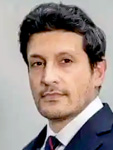
Carlos Galan, Graduate in Law from the Autonomous University of Madrid, Master in International Relations and Communication from the Camilo José Cela University.He has worked in numerous public and private entities dedicated to the security sector, cybersecurity, hybrid threats and cognitive warfare. He has developed research activities for the European Parliament, NATO, the Spanish Department of National Security, etc. He has been a university professor at numerous universities around the world and is currently the Director of the Master in intelligence analysis and cyberintelligence at Nebrija University in Spain.

Ferdinand Gehringer has been working at the Konrad-Adenauer-Stiftung since March 2021 and since November 2021 as a Policy Advisor for Cybersecurity in the Department International Politics and Security. Prior to that, he initially worked as a Policy Advisor for International Law and Rule of Law and he was the Coordinator of the Foundation's Rule of Law Programmes. Ferdinand Gehringer is a licensed lawyer and certified mediator. He studied law at the Johannes Gutenberg University in Mainz and at the Universidad de Valencia (Spain). After gaining professional experience at the law firm Hengeler Mueller in commercial law, at the European Parliament in Strasbourg and Brussels and at Roedl & Partner Abogados y Asesores in Barcelona, he completed his studies with the first state law examination in Mainz. During his legal clerkship at the Higher Regional Court of Frankfurt am Main, he worked, among others, for the Federal Supervisory Authority for Air Traffic Control in Langen, the German Ministry of Foreign Affairs at the German Embassy in Yerevan (Armenia), the law firm Taylor Wessing in construction and real estate law and for the Rule of Law Program Latin America (Colombia) of the Konrad-Adenauer-Stitung, before he completed his clerkshop with the second state law examination.

Marco Lombardi, director of ITSTIME research center, is full professor at the Catholic University of Sacred Heart, where he teaches Crisis management and risk communication, Mass Communication theory, Sociology, Intelligence and counter terrorism, Security policies. He is member of the scientific board of the School of Doctorate, the masters in Cultural Diplomacy and the School of Journalism. He managed several EU founded research projects mainly focused on terrorism, security and crisis management. He co-operates with different institutional agencies involved on security both at national and international level. He is member of the Governmental Commission on Counter Radicalization and of the Strategic Policy Committee of the Italian Ministry of Foreign Affairs and International Cooperation. He is member of the board of “JD – Journal for Deradicalization” (www.journal-derad.com), “Journal of Mediterranean and Balkan Intelligence – JMBI” and “Sicurezza, Terrorismo e Società – STS” (www.sicurezzaterrorismosocieta.it

Sandra Wassbro works as Lead Analyst with the Swedish Police Authority at Stockholm Regional Police HQ, with a background from the field of crisis management where she previously was with the Swedish Civil Contingencies Agency and in consulting roles.
Holding a master's degree in Political Science with focus on Crisis Management and Security from The Swedish Defence University, her areas of interest and focus of her work since has been focused on crisis preparedness, hybrid threats, democratic governance and bio politics.

Anders Strindberg is Senior Researcher with the Swedish Defence Research Agency (FOI), Defense Analysis Division, Senior Analyst with the Swedish Police Authority at Stockholm Regional Police HQ, and Senior Faculty at the Centre for Homeland Defense and Security, U.S. Naval Postgraduate School, Monterey, California, USA.
His work has generally focused on violent extremism and terrorism, hybrid threat actors and ways in which to secure democratic governance.
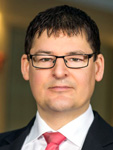
Docent Dr. Mikael Weissmann is a Senior Lecturer in War Studies and the Deputy Head of the Land Operations Division at the Department of War Studies at the Swedish Defence University. He co-convenes the Hybrid Threats Research Group (HTRG) and the Land Warfare Research Group (LWRG), and is the Principal Investigator of the project “Building Resilience and Psychological Defence: Countering Hybrid Threats and Foreign Influence and Interference.”Dr. Weissmann has held positions at the Swedish Institute of International Affairs, the Swedish Defence Research Agency (FOI), Copenhagen University, Stockholm University, Uppsala University, and the Stockholm International Peace Research Institute (SIPRI). He has been a visiting fellow at several esteemed institutions, including the Belgrade Centre for Security Policy in Serbia; the S. Rajaratnam School of International Studies (RSIS) at Nanyang Technological University in Singapore; the University of Warwick in the United Kingdom; and Peking University, Renmin University, and China Foreign Affairs University in China.
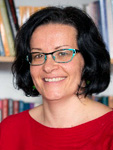
Věra Stojarová works as an academic researcher and associate professor at the Department of Political Science in the Faculty of Social Studies at Masaryk University in Brno, Czech Republic. She has been focusing for the whole of her professional career on security and politics in the Western Balkans.
She has published many papers on security and politics in the Western Balkan region and has also cooperated with the NGOs, lecturing about the security problems faced by societies in transition.

Silvano Rizieri Lucini is a research-analyst at the Italian Team for SecurityTerroristic Issues and Managing Emergencies – ITSTIME. He has a BA in Linguistic Expert for International Relations at Università Cattolica del Sacro Cuore (UCSC) in Brescia, a MA in European and International Politics earned as well at UCSC in Milan a Master in Middle Eastern Studies (MIMES) at ASERI. He specialised in digital HUMINT (Human Intelligence) and OSINT/ SOCMINT (Open Source and Social Media Intelligence) oriented in particular on Islamic terrorism, Whitejihadism and right-wing extremism. He focused on monitoring terrorist networks (from clear to dark and deep web), with particular attention to new communication strategies implemented by terrorist organisations.
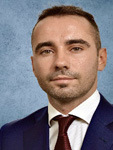
Alessandro Bolpagni is a research analyst at the Italian Team for Security, Terroristic Issues, and Managing Emergencies – ITSTIME. He has a BA in Foreign Languages and International Relations from the Università Cattolica del Sacro Cuore (UCSC), an MA in European and International Policies earned as well at UCSC, and a Postgraduate Master in Middle Eastern Studies (MIMES) at the Alta Scuola di Economia e Relazioni Internazionali (ASERI). He also specialised in digital HUMINT (Human Intelligence) and OSINT/SOCMINT (Open Source and Social Media Intelligence), oriented particularly on Islamic terrorism and Russian Private Military Companies (PMCs). He focused on monitoring terrorist networks and modelling recruitment tactics in the digital environment, particularly on new communication technologies implemented by terrorist organizations. He has produced operational reports and lectures for training and education purposes for companies, research centres, and law enforcement agencies.

ir. Yvan De Mesmaeker, Secretary general of the European Corporate Security Association – ECSA, is a Civil Engineer with over 25 years of professional experience in Corporate Security and Resilience.
The European Corporate Security Association - ECSA, a non-for-profit Professional Association of Managers and Officials in charge of the Security & Resilience of Corporations and International Institutions.

Francesca E. Strat is a competitive strategic intelligence analyst inMilan, Italy. She previously worked in the intelligence field as an intern at OTH Regensburg, Germany, and also concluded an internship at the George C. Marshall European Center for Security Studies in Garmisch-Partenkirchen, Germany. She completed a bachelor’ degree in Psychological Science from the University of Padua, Italy, and obtained with distinction the Erasmus Mundus International Master in Security, Intelligence & Strategic Studies (IMSISS) at the Universities of Glasgow, Dublin, and Prague. Her thesis explored the domestic consequences of the implementation of technological surveillance measures in China and Israel. Moreover, she published an co-authored article on The Irregular Warfare Center websites aboth transnational organised crime in the strategic competition environment.

Saurav Narain is a PhD Candidate with the War, Peace and Justice research group at Institue for Security and Global Affairs at Leiden University, Netherlands. He is funded through the EU’s Horizon Europe MSCA EU-GLOCTER doctoral network. His doctoral research focuses on EU Counterterrorism, United Nations and Local Peacekeeping. He is exploring novel approaches for the EU to exert its security persona increase coordination with the United Nations in counterterrorism and local peacekeeping. He holds an Erasmus Mundus International Master in Security, Intelligence and Strategic Studies from the University of Glasgow, Dublin City University and Charles University, Prague. He also graduated in international relations from Leiden University, the Netherlands in 2020 and has completed an internship at the Austrian Insitute for European Security Policy, Vienna in 2023. He has published a focus paper with AIES titled “Balancing Interests and Promoting Democracy - The India-EU Trade and Technology Council”.
His research interests include the European Union’s security strategy, the EU in the emerging order in the Indo-Pacific, multilateralism in global order, people-centric critical approaches to counterterrorism and peacekeeping. He is interested to explore the role Europe and the Global South has to play in different aspects of the emerging multipolarity between China and the US in a whole range of domains from economics, cultural capital to a peacekeeping force or a military ally. His co-presented paper at the 9th Zagreb Securty Forum aims to allude to this focus of research.

Giorgia Piovesan obtained a Bachelor’s degree in Political Science and International Relations, from Università degli Studi di Roma Tre in Italy. Following her graduation, she worked as a Cyber Security Analyst for Emerging Technologies for Deloitte, where she acquired valuable technical knowled on AI, quantum technology and IoT. Her passion for international security, particularly in the East Asian region, prompted her to join the International Master in Security, Intelligence and Strategic Studies at the consortium University of Glasgow, Dublin City University and Charles University. Giorgia worked as Research Assistant in several thinks tanks, as the Institute of International Relations in Prague, the Global Arena Research Institute and the Stockholm Center for South Asian and Indo-Pacific Affairs.

Iulia-Mihaela Drăgan is a PhD student in Intelligence and National Security at ”Carol I” National Defence University Bucharest, from 2023. She also has a bachelor’s degree in law at the University of Bucharest from 2019 and two master degrees: a master in ”Security and Diplomacy” at the National University for Political Studies and Public Administration graduated in 2022 and a master in ”European Union Law” at the University of Bucharest graduated in 2020. She graduated Romanian Diplomatic Institute in 2023, Romanian National Defence College at ”Carol I” National Defence University in 2022 and Romanian National College for Home Affairs at ”A.I. Cuza” Romanian Police Academy in 2023. Ms. Iulia-Mihaela Drăgan is an alumni of the ”Leadership” postgraduate program from the Psychology and Educational Sciences Faculty at the University of Bucharest from 2023.

Anastasios-Nikolaos Kanellopoulos is a PhD candidate of the Athens University of Economics and Business, holds a Master in International Relations, Strategy and Security from the University of Neapolis Pafos in Cyprus and a Bachelor in Business Administration from the Athens University of Economics and Business. In addition, he is a certified Security Risk Analyst from FRONTEX and the Hellenic Ministry of Citizen Protection. His research interests include Competitive Intelligence and Counterintelligence frameworks application in modern Business environment.

Dr. Anthony Ioannidis is an Academic Advisor at the Research Institute for European and American Studies (RIEAS) and an Assistant Professor of Management at the Department of Business Administration, Athens University of Economics and Business, Greece. He has previously taught at the University of Patras, Greece, University of La Verne California, and Baruch College - City University of New York. He holds a B.S. from the University of Athens, Greece, and an M.B.A., an M.Phil., and a Ph.D. from Baruch College - City University of New York. Dr. Ioannidis also possesses working experience as management consultant with leading consultancy firms in the United States and Greece, in the areas Telecommunications, Media and Technology. His current research interests include strategy formation, organizational design, public-private partnerships, and entrepreneurship.

LtCol Ivona Balić Dorić, born in 1979 in Split. After graduating as an engineer of maritime affairs she was commissioned as a Navy Officer to Croatian Navy. Her first duty was as a commander of the armed ships detachment on the minelayer and she held that position for six years. Afterwards she did protocol and civil-military cooperation activities. In 2020, when she graduated as an operations planning officer in the Croatian Navy Fleet Operations Department. From 2022, as the Ministry of Defence scholar, she has been attending postgraduate studies at the Maritime faculty in Rijeka. In the past five years her passions have been public affairs so she has completed several courses at public speaking academy. She has several personal awards from the Croatian Navy Commander and the Croatian Navy Fleet Commander. She is married and a mother of two children.
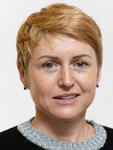
Dr Mariana Rosca is the project director at Transilvania University of Brasov, Romania within the research project “Resilient societies in the wake of persistent crises. A case study of Ukrainian women refugees’ digital work” financed by the Ministry of Research, Innovation and Digitalization, Romania and coordinating scientific researcher within the state subprogram “Strengthening socio-economic and judicial mechanisms for ensuring the well-being and security of citizens” at the Institute of legal, political and sociological research, Moldova State University. Mariana is also a trainer and project manager, teacher for the master course “IT regulations and human rights” for the Centre for European studies, Yerevan State University, Armenia. With a PhD in “Human Rights: Ethical, Social and Political Challenges”, from the Deusto University, Spain, and a PhD in “Social Philosophy” from History Institute, Moldova, Mariana’s research interest and curiosity focused on integration policies of religious minorities, migrants, diasporas, refugees, as well as security, digitalization and AI. Mariana was a Board Member of Marie Curie Alumni Association (2022-2024) and is a fellow researcher of INIS.

Professor Rodica Ciobanu, has a Ph.D. in Law, and a Ph.D. in Philosophy, is member of the Superior Council of Prosecutors, Head of the Department of Public Law, Faculty of Law, Moldova State University, Member of the Social, Economic, Humanistic and Arts Sciences Section of the Academy of Sciences of Moldova, Director of the State Subprogram Strengthening Socio-economic and Judicial Mechanisms for Ensuring the Well-being and Security of Citizens (2024-2027) within the Institute of Legal, Political and Sociological Research.
She is involved in working groups of the Moldovan authorities to draft normative acts and assess the processes of development and implementation of reforms in areas of human rights, judiciary system, legal education, strategic communication, etc. She has developed collaborations with research centres and international organizations, which have contributed to the development of new studies, evaluation reports and master's programmes in the field of national security and specialized courses in areas of: IT Regulations and Human Rights, Protection of Children's Rights in the Online Space, Right to a safe Environment, etc.
Between 2020-2023 she coordinated the implementation of the research project Modernization of Governance Mechanisms focused on the Protection of Human Rights (number 20.80009.1606.15), as well as conducted research and edited collective monographs, prepared progress assessment reports, studies, guidelines and expert reviews of research projects. She is the author of over 100 scientific publications. The teams of researchers she has coordinated have achieved high results prised with gold, silver and bronze medals at invention fairs.
She is a national expert of the Council of Europe within the project Partnership for Good Governance III (2023-2027) Support for the further modernization of the management of the courts in the Republic of Moldova (CEPEJ Project), she collaborates with the UN in the development of training materials for the lifelong learning of the seniors, and she was involved as an expert in the working groups organized for the modernization of higher education in the Republic of Moldova with the World Bank.

Margareta Gregić achieved a Master's degree in Theology and Philosophy at Catholic Faculty of Theology in Đakovo, University Josip Juraj Strossmayer in Osijek, Croatia. After one year of work experience as a high school teacher, she achieved university public relations specialist degree at Faculty of Political sciences in Zagreb, Croatia. Presently, she is engaged as a PhD candidate in the field of information and communication sciences, with focus on media and communication at the University North in Koprivnica, Croatia. She was engaged in Croatian Caritas as a field coordinator during the refugee crisis, where she was involved in coordinating aid to refugees in refugee camp in Opatovac and Winter transit center in Slavonski Brod, she was also responsible for public relations with media and other non-governmental organizations. Currently Margareta works as coordinator of the Đakovo-Osijek archbishop's vicariate in Osijek, Croatia. This is her second time participating in Zagreb Security Forum on the panel for young researches.

Jelena Božić achieved a Master of Law degree with a specialization in criminal law, which she obtained from the Faculty of law at the University Josip Juraj Strossmayer in Osijek. Furthermore, she is presently engaged as a PhD candidate in the field of information and communication sciences, with a specific focus on media and communication, at the University North in Croatia. In addition to her academic accomplishments, she served in the capacity of a senior advisor for EU affairs and project manager in numerous institutions. Within her current professional role, Jelena assumes the position of senior advisor for culture at the Culture and Tourism Office within the City of Vinkovci.

Zunaira Khan is a security and intelligence analyst who has done her Masters in Intelligence and Security studies, United Kingdom. She has become the first South Asian female to work on the role of women in intelligence during Cold War and post 9/11 era with a special focus on CIA. She is the member of Women in Intelligence Network at King College London, worked with Royal Air Force and Ministry of Defense, United Kingdom and the Alumni of Common Mission Project. Her focus of analysis is also on Defense strategies and nuclear intelligence in addition to IMINT, SIGINT, GEOINT, ISR, SPY places, Space craft and War planes. She aims to further her goal of highlighting the potential of women in the field of intelligence and the need for inclusivity in security sector to combat the emerging threats.

Zdeněk Rod is a research fellow and teaching fellow at the University of West Bohemia in Pilsen, Department of Politics and International Relations. In addition to his academic roles, Zdenek also co-runs the Center for Security Consulting in Prague, is a research fellow at the German policy think-tank Young Security Conference, and a member of the academic committee of TOPAZ, a political think-tank of Czech liberal party TOP 09. Zdenek's expertise lies in security studies, conflict resolution, hybrid threats, and strategic communication. His academic journey has included studies at universities in Ljubljana and Budapest and the European Security and Defence Colleague in Brussels. He has undertaken research visits, including one to the NATO CIMIC Centre of Excellence in The Hague. Before his academic pursuits, Zdenek contributed to the Czech Ministry of Defense, bringing practical experience to complement his scholarly endeavors. He has a rich publication history, having authored and co-authored numerous academic and policy articles. His contributions extend to active involvement in national and international research projects.

Mathias Desmet is academic assistant and PhD researcher at Ghent University (Belgium). His research is focused on cultural heritage crime, more specifically the smuggling and laundering of looted cultural goods. Additionally, he is a board member of the Belgian Intelligence Studies Centre (BISC).

Ante Batistić, MA, holds Master degrees in History (Modern and Contemporary History) and Diplomacy and International Relations (National and International Security). He is actively engaged in scientific research in the field of Intelligence and Security. He is a member of the Hybrid Warfare Research Institute. Currently, he is employed as a Senior Officer in the Office for International and Interinstitutional Cooperation at Dr. Franjo Tuđman Defense and Security University.
Important information:
- Forum is organised according to pandemic situation in a hybrid way – “in situ” and online
- Every activity (conference halls, restaurants, coffee breaks, rooms) are going to be organised in a Hotel due to the disease prevention.
- Forum organisers are reserving the right to change the Program according to the necessities.